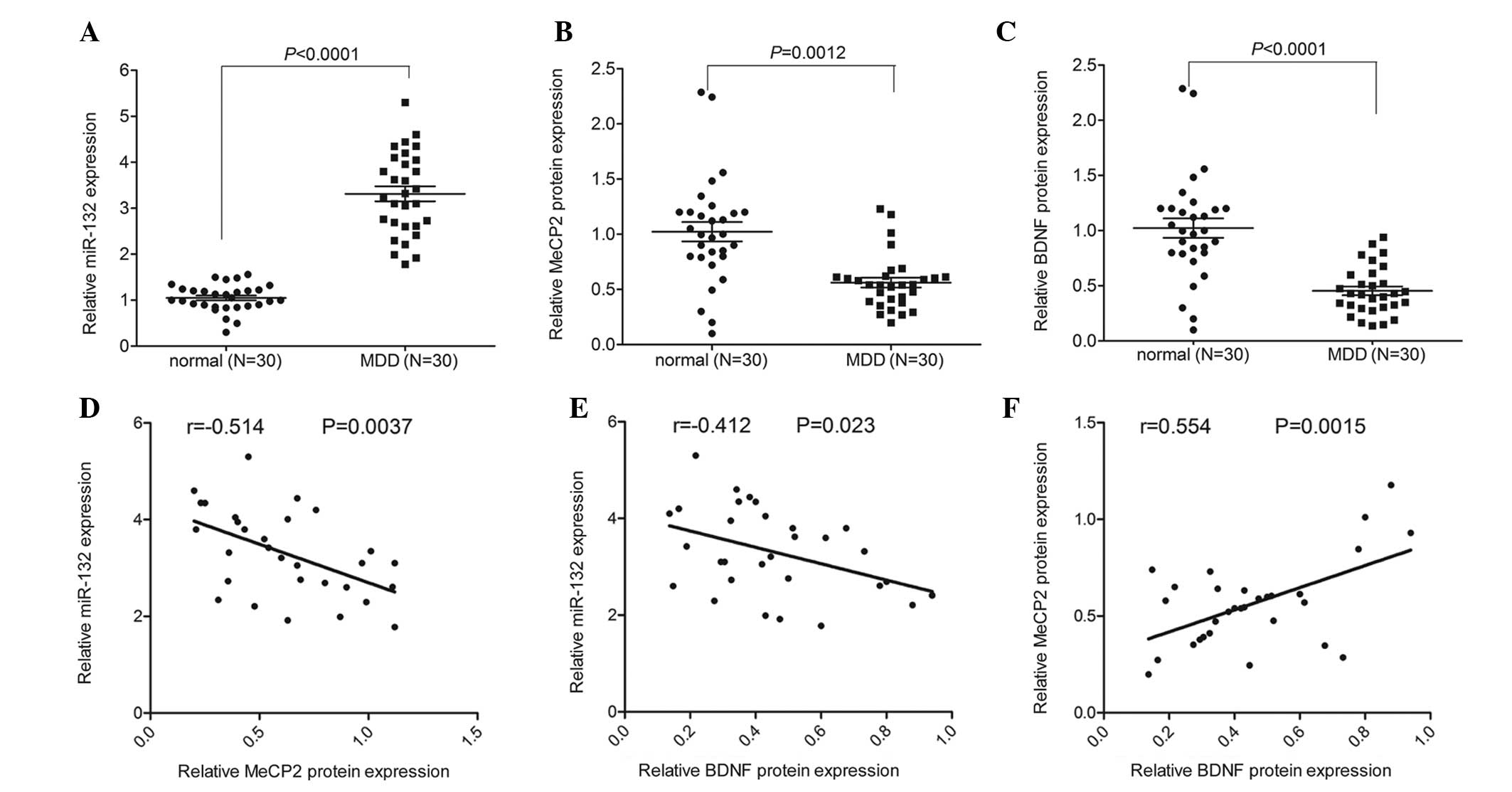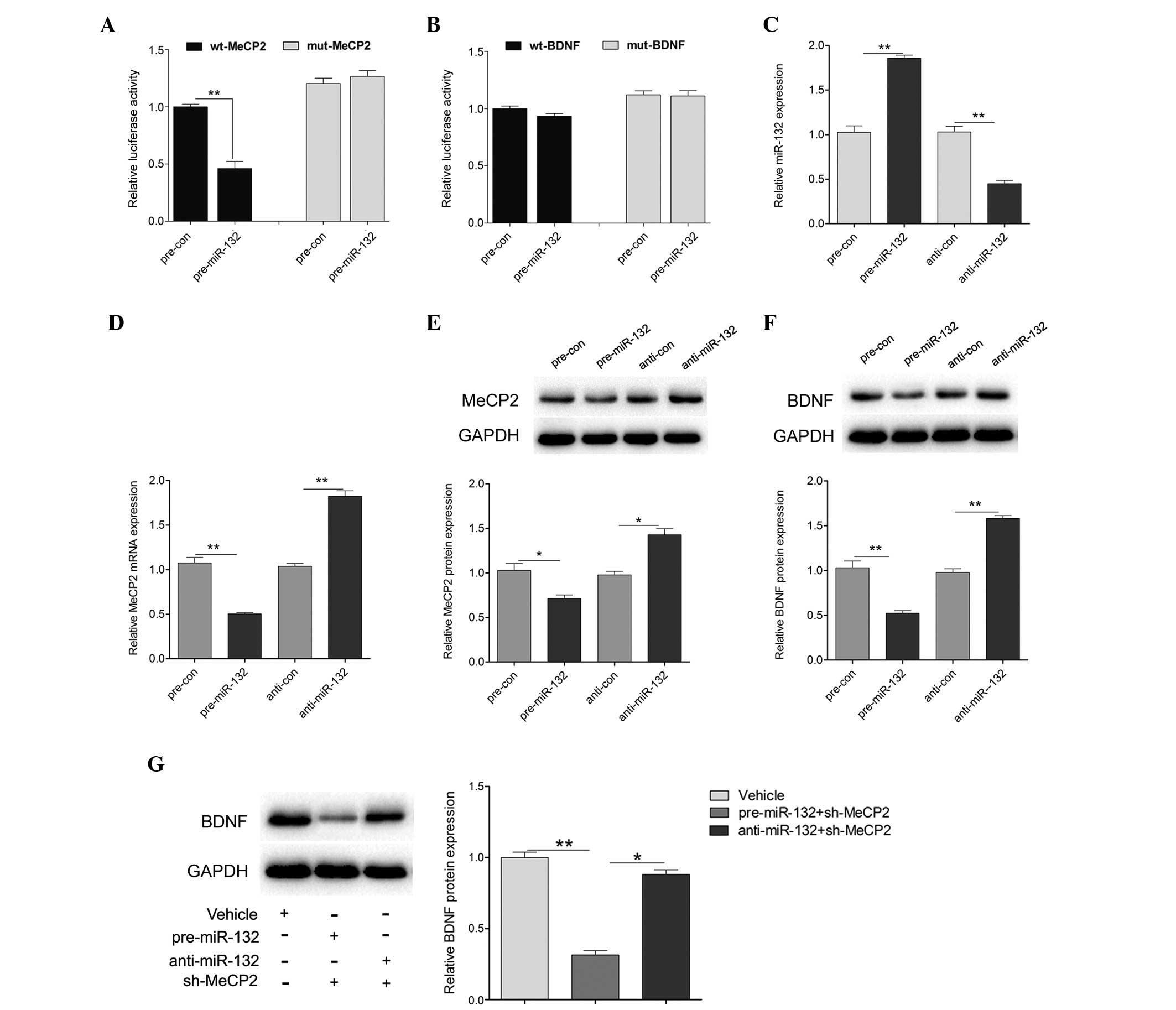|
1
|
Dwivedi Y: Emerging role of microRNAs in
major depressive disorder: Diagnosis and therapeutic implications.
Dialogues Clin Neurosci. 16:43–61. 2014.PubMed/NCBI
|
|
2
|
Mouillet-Richard S, Baudry A, Launay JM
and Kellermann O: MicroRNAs and depression. Neurobiol Dis.
46:272–278. 2012. View Article : Google Scholar : PubMed/NCBI
|
|
3
|
Sala M, Perez J, Soloff P, Ucelli di Nemi
S, Caverzasi E, Soares JC and Brambilla P: Stress and hippocampal
abnormalities in psychiatric disorders. Eur Neuropsychopharmacol.
14:393–405. 2004. View Article : Google Scholar : PubMed/NCBI
|
|
4
|
Li M, Fu Q, Li Y, Li S, Xue J and Ma S:
Emodin opposes chronic unpredictable mild stress induced
depressive-like behavior in mice by upregulating the levels of
hippocampal glucocorticoid receptor and brain-derived neurotrophic
factor. Fitoterapia. 98:1–10. 2014. View Article : Google Scholar : PubMed/NCBI
|
|
5
|
Maripuu M, Wikgren M, Karling P, Adolfsson
R and Norrback KF: Relative hypo- and hypercortisolism are both
associated with depression and lower quality of life in bipolar
disorder: A cross-sectional study. PLoS One. 9:e986822014.
View Article : Google Scholar : PubMed/NCBI
|
|
6
|
Réus GZ, Abelaira HM, Stringari RB, Fries
GR, Kapczinski F and Quevedo J: Memantine treatment reverses
anhedonia, normalizes corticosterone levels and increases BDNF
levels in the prefrontal cortex induced by chronic mild stress in
rats. Metab Brain Dis. 27:175–182. 2012. View Article : Google Scholar : PubMed/NCBI
|
|
7
|
Li YJ, Xu M, Gao ZH, Wang YQ, Yue Z, Zhang
YX, Li XX, Zhang C, Xie SY and Wang PY: Alterations of serum levels
of BDNF-related miRNAs in patients with depression. PLoS One.
8:e636482013. View Article : Google Scholar : PubMed/NCBI
|
|
8
|
Bai M, Zhu X, Zhang Y, Zhang S, Zhang L,
Xue L, Yi J, Yao S and Zhang X: Abnormal hippocampal BDNF and
miR-16 expression is associated with depression-like behaviors
induced by stress during early life. PLoS One. 7:e469212012.
View Article : Google Scholar : PubMed/NCBI
|
|
9
|
Bahi A, Chandrasekar V and Dreyer JL:
Selective lentiviral-mediated suppression of microRNA124a in the
hippocampus evokes antidepressants-like effects in rats.
Psychoneuroendocrinology. 46:78–87. 2014. View Article : Google Scholar : PubMed/NCBI
|
|
10
|
O'Connor RM, Grenham S, Dinan TG and Cryan
JF: microRNAs as novel antidepressant targets: Converging effects
of ketamine and electroconvulsive shock therapy in the rat
hippocampus. Int J Neuropsychopharmacol. 16:1885–1892. 2013.
View Article : Google Scholar : PubMed/NCBI
|
|
11
|
Dell'Osso B, D'Addario C, Carlotta Palazzo
M, Benatti B, Camuri G, Galimberti D, Fenoglio C, Scarpini E, Di
Francesco A, Maccarrone M and Altamura AC: Epigenetic modulation of
BDNF gene: Differences in DNA methylation between unipolar and
bipolar patients. J Affect Disord. 166:330–333. 2014. View Article : Google Scholar : PubMed/NCBI
|
|
12
|
Zucchi FC, Yao Y, Ward ID, Ilnytskyy Y,
Olson DM, Benzies K, Kovalchuk I, Kovalchuk O and Metz GA: Maternal
stress induces epigenetic signatures of psychiatric and
neurological diseases in the offspring. PLoS One. 8:e569672013.
View Article : Google Scholar : PubMed/NCBI
|
|
13
|
Murgatroyd C, Wu Y, Bockmühl Y and
Spengler D: Genes learn from stress: How infantile trauma programs
us for depression. Epigenetics. 5:194–199. 2010. View Article : Google Scholar : PubMed/NCBI
|
|
14
|
Forlani G, Giarda E, Ala U, Di Cunto F,
Salani M, Tupler R, Kilstrup-Nielsen C and Landsberger N: The
MeCP2/YY1 interaction regulates ANT1 expression at 4q35: Novel
hints for Rett syndrome pathogenesis. Hum Mol Genet. 19:3114–3123.
2010. View Article : Google Scholar : PubMed/NCBI
|
|
15
|
Hutchinson AN, Deng JV, Cohen S and West
AE: Phosphorylation of MeCP2 at Ser421 contributes to chronic
antidepressant action. J Neurosci. 32:14355–14363. 2012. View Article : Google Scholar : PubMed/NCBI
|
|
16
|
Murgatroyd C, Patchev AV, Wu Y, Micale V,
Bockmühl Y, Fischer D, Holsboer F, Wotjak CT, Almeida OF and
Spengler D: Dynamic DNA methylation programs persistent adverse
effects of early-life stress. Nat Neurosci. 12:1559–1566. 2009.
View Article : Google Scholar : PubMed/NCBI
|
|
17
|
Wada R, Akiyama Y, Hashimoto Y, Fukamachi
H and Yuasa Y: miR-212 is downregulated and suppresses
methyl-CpG-binding protein MeCP2 in human gastric cancer. Int J
Cancer. 127:1106–1114. 2010. View Article : Google Scholar
|
|
18
|
Klein ME, Lioy DT, Ma L, Impey S, Mandel G
and Goodman RH: Homeostatic regulation of MeCP2 expression by a
CREB-induced microRNA. Nat Neurosci. 10:1513–1514. 2007. View Article : Google Scholar : PubMed/NCBI
|
|
19
|
Im HI, Hollander JA, Bali P and Kenny PJ:
MeCP2 controls BDNF expression and cocaine intake through
homeostatic interactions with microRNA-212. Nat Neurosci.
13:1120–1127. 2010. View
Article : Google Scholar : PubMed/NCBI
|
|
20
|
Luo YW, Xu Y, Cao WY, Zhong XL, Duan J,
Wang XQ, Hu ZL, Li F, Zhang JY, Zhou M, Dai RP and Li CQ:
Insulin-like growth factor 2 mitigates depressive behavior in a rat
model of chronic stress. Neuropharmacology. 89:318–324. 2015.
View Article : Google Scholar
|
|
21
|
Munno D, Sterpone S, Fania S, Cappellin F,
Mengozzi G, Saroldi M, Bechon E and Zullo G: Plasma brain derived
neurotrophic factor levels and neuropsychological aspects of
depressed patients treated with paroxetine. Panminerva Med.
55:377–384. 2013.
|
|
22
|
Yu H, Wang DD, Wang Y, Liu T, Lee FS and
Chen ZY: Variant brain-derived neurotrophic factor Val66Met
polymorphism alters vulnerability to stress and response to
antidepressants. J Neurosci. 32:4092–4101. 2012. View Article : Google Scholar : PubMed/NCBI
|
|
23
|
Carballedo A, Amico F, Ugwu I, Fagan AJ,
Fahey C, Morris D, Meaney JF, Leemans A and Frodl T: Reduced
fractional anisotropy in the uncinate fasciculus in patients with
major depression carrying the met-allele of the Val66Met
brain-derived neurotrophic factor genotype. Am J Med Genet B
Neuropsychiatr Genet. 159B:537–548. 2012. View Article : Google Scholar : PubMed/NCBI
|
|
24
|
Valvassori SS, Budni J, Varela RB and
Quevedo J: Contributions of animal models to the study of mood
disorders. Rev Bras Psiquiatr. 35(Suppl 2): S121–S131. 2013.
View Article : Google Scholar : PubMed/NCBI
|
|
25
|
Xu X, Kozikowski AP and Pozzo-Miller L: A
selective histone deacetylase-6 inhibitor improves BDNF trafficking
in hippocampal neurons from Mecp2 knockout mice: Implications for
Rett syndrome. Front Cell Neurosci. 8:682014. View Article : Google Scholar : PubMed/NCBI
|
|
26
|
Khoshnan A and Patterson PH: Elevated IKKα
accelerates the differentiation of human neuronal progenitor cells
and induces MeCP2-dependent BDNF expression. PLoS One.
7:e417942012. View Article : Google Scholar
|
|
27
|
Cortés-Mendoza J, Díaz de León-Guerrero S,
Pedraza-Alva G and Pérez-Martínez L: Shaping synaptic plasticity:
the role of activity-mediated epigenetic regulation on gene
transcription. Int J Dev Neurosci. 31:359–369. 2013. View Article : Google Scholar : PubMed/NCBI
|
|
28
|
Lv J, Xin Y, Zhou W and Qiu Z: The
epigenetic switches for neural development and psychiatric
disorders. J Genet Genomics. 40:339–346. 2013. View Article : Google Scholar : PubMed/NCBI
|
|
29
|
Li H, Zhong X, Chau KF, Williams EC and
Chang Q: Loss of activity-induced phosphorylation of MeCP2 enhances
synaptogenesis, LTP and spatial memory. Nat Neurosci. 14:1001–1008.
2011. View
Article : Google Scholar : PubMed/NCBI
|
|
30
|
Li W, Calfa G, Larimore J and Pozzo-Miller
L: Activity-dependent BDNF release and TRPC signaling is impaired
in hippocampal neurons of Mecp2 mutant mice. Proc Natl Acad Sci
USA. 109:17087–17092. 2012. View Article : Google Scholar : PubMed/NCBI
|
|
31
|
Chang Q, Khare G, Dani V, Nelson S and
Jaenisch R: The disease progression of Mecp2 mutant mice is
affected by the level of BDNF expression. Neuron. 49:341–348. 2006.
View Article : Google Scholar : PubMed/NCBI
|
|
32
|
Zhou Z, Hong EJ, Cohen S, Zhao WN, Ho HY,
Schmidt L, Chen WG, Lin Y, Savner E, Griffith EC, et al:
Brain-specific phosphorylation of MeCP2 regulates
activity-dependent Bdnf transcription, dendritic growth, and spine
maturation. Neuron. 52:255–269. 2006. View Article : Google Scholar : PubMed/NCBI
|
|
33
|
Oved K, Morag A, Pasmanik-Chor M,
Oron-Karni V, Shomron N, Rehavi M, Stingl JC and Gurwitz D:
Genome-wide miRNA expression profiling of human lymphoblastoid cell
lines identifies tentative SSRI antidepressant response biomarkers.
Pharmacogenomics. 13:1129–1139. 2012. View Article : Google Scholar : PubMed/NCBI
|
|
34
|
Scott HL, Tamagnini F, Narduzzo KE,
Howarth JL, Lee YB, Wong LF, Brown MW, Warburton EC, Bashir ZI and
Uney JB: MicroRNA-132 regulates recognition memory and synaptic
plasticity in the perirhinal cortex. Eur J Neurosci. 36:2941–2948.
2012. View Article : Google Scholar : PubMed/NCBI
|
|
35
|
Shaltiel G, Hanan M, Wolf Y, Barbash S,
Kovalev E, Shoham S and Soreq H: Hippocampal microRNA-132 mediates
stress-inducible cognitive deficits through its
acetylcholinesterase target. Brain Struct Funct. 218:59–72. 2013.
View Article : Google Scholar :
|
|
36
|
Abuhatzira L, Makedonski K, Kaufman Y,
Razin A and Shemer R: MeCP2 deficiency in the brain decreases BDNF
levels by REST/CoREST-mediated repression and increases TRKB
production. Epigenetics. 2:214–222. 2007. View Article : Google Scholar : PubMed/NCBI
|
|
37
|
Chahrour M, Jung SY, Shaw C, Zhou X, Wong
ST, Qin J and Zoghbi HY: MeCP2, a key contributor to neurological
disease, activates and represses transcription. Science.
320:1224–1229. 2008. View Article : Google Scholar : PubMed/NCBI
|


















